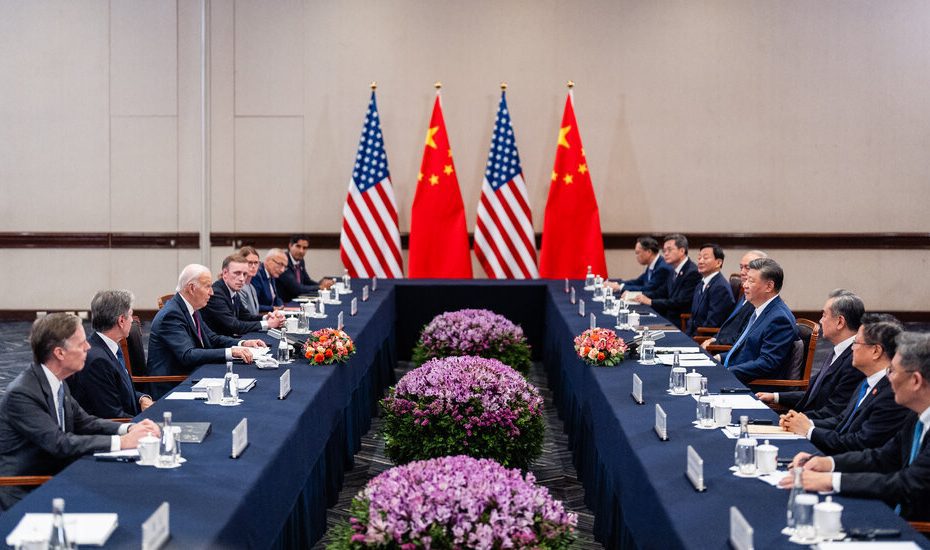U.S. Ambassador to China R. Nicholas Burns said the Biden administration is making a last-ditch effort to convince China to stop transferring equipment to Russia for the war in Ukraine.
Mr. Burns claimed in an interview at the U.S. Embassy in Beijing that nearly 400 Chinese companies have supplied Russia with so-called dual-use items, products with both military and commercial applications. He also said China has supplied 90 percent of the microelectronics used in Russia's war effort.
With less than two weeks to go before President-elect Donald J. Trump takes office, Mr. Burns is raising the administration's concerns about Russia and China's alignment with Iran and North Korea during a series of meetings this week. early next week. He will leave the country next Tuesday.
More broadly, Mr Burns said China's policies towards Russia, Iran and North Korea were inconsistent with Beijing's desire to play a leading role in global-order international initiatives such as the World Trade Organization and the Paris Agreement about climate change.
“Their actions are disruptive because they align themselves with the most untrustworthy agents of disorder in the international system,” he said. “So the Chinese can't have it both ways; They have to make a decision here.”
He also said China, which buys vast amounts of oil from Iran, should use its influence to insist that Iran stop the Tehran-backed Houthi militia from attacking commercial shipping in the Red Sea.
Mr Burns met this week with senior officials including Ma Zhaoxu, the executive vice minister of foreign affairs, and Liu Jianchao, who heads the Chinese Communist Party's international department and is expected to become the next foreign minister. He has more meetings next week.
The Chinese Foreign Ministry had no immediate comment. But in recent news briefings, Chinese officials have denied supplying Russia or Ukraine with dual-use items such as drones for military use.
“China never supplies weapons to the parties to the conflict and strictly controls the export of dual-use items, and China's scope and measures for drone export control are the strictest in the world,” said Lin Jian, a ministry spokesperson of Foreign Affairs, in December. 17.
Chinese officials have also taken the position that while the West has imposed sanctions on Iran's oil sales over its nuclear weapons development program, the United Nations has not. Thus, China has felt no legal obligation to avoid purchasing Iranian oil, which sells at a steep discount to world market prices because other countries avoid it.
China has quadrupled imports of Iranian oil in the nearly two years since Iran's peace deal with Saudi Arabia, buying more than 90 percent of Iran's oil exports last year, according to Kpler, a Vienna-based company that specializes in is in tracking Iranian oil shipments. . Oil sales to China by Iran's state oil sector represent more than 5 percent of the entire Iranian economy, and they pay for a large part of the Iranian government's activities.
Iran has suffered a series of setbacks, including an Israeli airstrike on Tehran's air defenses and Israel's defeat of Iran's main ally in Lebanon, Hezbollah. China responded by sending one of its four vice premiers, Zhang Guoqing, to meet President Masoud Pezeshkian of Iran in Tehran last month.
“China supports Iran in protecting its national sovereignty, security, territorial integrity and its legitimate rights and interests,” Mr. Zhang said in Tehran.
Andon Pavlov, a senior analyst at Kpler, said Thursday that the Biden administration is expected to expand its blacklist of tankers that have carried Russian or Iranian oil, and that China will likely deny these ships access to its ports. Reuters reported this week that officials in Shandong province, the main Chinese entry point for Iranian oil, have started blocking blacklisted tankers from entering ports.
But Mr. Pavlov said Iran's methods of shipping oil to China are so opaque that it is difficult to predict the effectiveness of such measures.
Mr. Burns's talks with senior Chinese officials this week and next are part of a broader recent diplomatic effort by the Biden administration. In November, President Biden met with Xi Jinping, China's top leader, at a conference in Peru, and in August, Jake Sullivan, the national security adviser, met with Mr Xi in Beijing.
While Burns declined to predict a possible Trump administration policy toward China, he said communications between the two countries' militaries had improved to avoid accidental confrontations. And last October, China allowed the remains of missing World War II American service members to be recovered for the first time in 13 years.
He also praised China's recent moves to restrict exports of chemicals used to make fentanyl, a powerful synthetic opioid that is the leading cause of drug overdose deaths in the United States. China has arrested 300 people in the fentanyl industry, closed many online stores that sell the precursor chemicals to produce fentanyl, and banned the export of 55 precursor chemicals and synthetic drugs, Mr. Burns said.
Li You research contributed.

